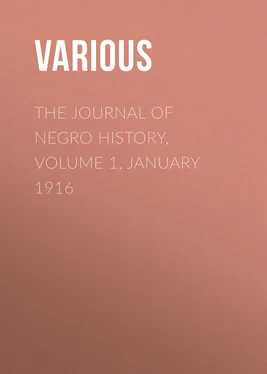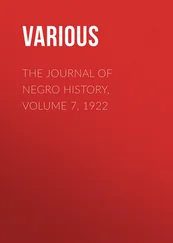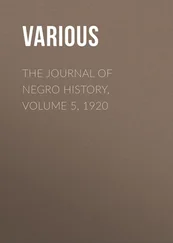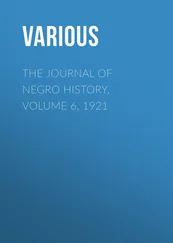Various - The Journal of Negro History, Volume 1, January 1916
Здесь есть возможность читать онлайн «Various - The Journal of Negro History, Volume 1, January 1916» — ознакомительный отрывок электронной книги совершенно бесплатно, а после прочтения отрывка купить полную версию. В некоторых случаях можно слушать аудио, скачать через торрент в формате fb2 и присутствует краткое содержание. Жанр: foreign_antique, periodic, История, foreign_edu, на английском языке. Описание произведения, (предисловие) а так же отзывы посетителей доступны на портале библиотеки ЛибКат.
- Название:The Journal of Negro History, Volume 1, January 1916
- Автор:
- Жанр:
- Год:неизвестен
- ISBN:нет данных
- Рейтинг книги:5 / 5. Голосов: 1
-
Избранное:Добавить в избранное
- Отзывы:
-
Ваша оценка:
- 100
- 1
- 2
- 3
- 4
- 5
The Journal of Negro History, Volume 1, January 1916: краткое содержание, описание и аннотация
Предлагаем к чтению аннотацию, описание, краткое содержание или предисловие (зависит от того, что написал сам автор книги «The Journal of Negro History, Volume 1, January 1916»). Если вы не нашли необходимую информацию о книге — напишите в комментариях, мы постараемся отыскать её.
The Journal of Negro History, Volume 1, January 1916 — читать онлайн ознакомительный отрывок
Ниже представлен текст книги, разбитый по страницам. Система сохранения места последней прочитанной страницы, позволяет с удобством читать онлайн бесплатно книгу «The Journal of Negro History, Volume 1, January 1916», без необходимости каждый раз заново искать на чём Вы остановились. Поставьте закладку, и сможете в любой момент перейти на страницу, на которой закончили чтение.
Интервал:
Закладка:
Last Lords Day, the 3rd October, was our quarterly baptism, when we walked from our place of Worship at noon, to the water, the distance of about a half mile, where I baptised eighteen professing believers, before a numerous and large congregation of spectators, which make in all 254 baptised by me since our commencement.
I am truly happy in acquainting you, that a greater spread of the gospel is taking place at the west end of the island.–A fortnight ago, the Rev. Brother Moses Baker visited me, he is a man of colour, a native of America, one of our baptist brothers and a member of our church, he is employed by a Mr. Winn, (a gentleman down in the country who possesses large and extensive properties in this island), to instruct his negroes in the principles of the Christian religion; and Mr. Vaughan has employed him for that purpose, and both these gentlemen allow him a compensation. Mr. Winn finds him in house room, lands, &c., &c., and by his instructing those slaves at Mr. Vaughan's properties, several miles from Mr. Winn's estate, a number of slaves belonging to different properties (no less than 20 sugar estates in number) are become converted souls.–Mr. Baker's errand to me was, that he wanted a person to assist him, he being sent for by a Mr. Hilton, a gentleman down in the parish of Westmoreland (50 miles distance from Mr. Baker's dwelling place), to instruct his and another gentlemen's slaves, on two large sugar estates, into the word of God, producing to me at the same time the letters and invitations he received. I gave him brother George Vineyard, one our exhorters, and old experienced professor (who has been called by grace upwards of eighteen years) to assist him; he also is a native of America, and this gentleman Mr. Hilton, has provided a House, and maintainance, a salary, and land for him to cultivate for his benefit upon his own estate, and brother Baker declared to me, that he has in the church there, fourteen hundred justified believers, and about three thousand followers, many under conviction for sin. The distance brother Baker is at from me is 136 miles, he has undergone a great deal of persecution and severe trials for the preaching of the gospel, but our Lord has delivered him safe out of all–Myself and brethren were at Mr. Liele's Chapel a few weeks ago at the funeral of one of his elders, he is well, and we were friendly together. All our brethren unite with me in giving their most Christian love to you, and all the dear beloved brethren in your church in the best bonds, and beg, both yourself and them, will be pleased to remember the Ethiopian Baptists in their prayers, and I remain dear Sir, and brother,
Your poor unworthy brother, in the Lord Jesus Christ,
(Signed) Thomas Nicholas Swigle.
P.S. These sugar estates, in the parish where Brother Baker resides, are very large and extensive; and they have three to four hundred slaves on each property.
–- Baptist Annual Register , 1800-1802, pages 1144-1146.
Book Reviews
The Haitian Revolution, 1791 to 1804 . By T. G. Steward. Thomas Y. Crowell Company, New York, 1915. 292 pages. $1.25.
In the days when the internal dissensions of Haiti are again thrusting her into the limelight such a book as this of Mr. Steward assumes a peculiar importance. It combines the unusual advantage of being both very readable and at the same time historically dependable. At the outset the author gives a brief sketch of the early settlement of Haiti, followed by a short account of her development along commercial and racial lines up to the Revolution of 1791. The story of this upheaval, of course, forms the basis of the book and is indissolubly connected with the story of Toussaint L'Overture. To most Americans this hero is known only as the subject of Wendell Phillips's stirring eulogy. As delineated by Mr. Steward, he becomes a more human creature, who performs exploits, that are nothing short of marvelous. Other men who have seemed to many of us merely names–Rigaud, Le Clerc, Desalines, and the like–are also fully discussed.
Although most of the book is naturally concerned with the revolutionary period, the author brings his account up to date by giving a very brief resumé of the history of Haiti from 1804 to the present time. This history is marked by the frequent occurrence of assassinations and revolutions, but the reader will not allow himself to be affected by disgust or prejudice at these facts particularly when he is reminded, as Mr. Steward says, "that the political history of Haiti does not differ greatly from that of the majority of South American Republics, nor does it differ widely even from that of France."
The book lacks a topical index, somewhat to its own disadvantage, but it contains a map of Haiti, a rather confusing appendix, a list of the Presidents of Haiti from 1804 to 1906 and a list of the names and works of the more noted Haitian authors. The author does not give a complete bibliography. He simply mentions in the beginning the names of a few authorities consulted.
J. R. Fauset.The Negro in American History . By John W. Cromwell. The American Negro Academy, Washington, D.C., 1914. 284 pages. $1.25 net.
In John W. Cromwell's book, "The Negro in American History," we have what is a very important work. The book is mainly biographical and topical. Some of the topics discussed are: "The Slave Code"; "Slave Insurrections"; "The Abolition of the Slave Trade"; "The Early Convention Movement"; "The Failure of Reconstruction"; "The Negro as a Soldier"; and "The Negro Church." These topics are independent of the chapters which are more particularly chronological in treatment.
In the appendices we have several topics succinctly treated. Among these are: "The Underground Railroad," "The Freedmen's Bureau," and, most important and wholly new, a list of soldiers of color who have received Congressional Medals of Honor, and the reasons for the bestowal.
The biographical sketches cover some twenty persons. Much of the information in these sketches is not new, as would be expected regarding such well-known persons as Frederick Douglass, John M. Langston, and Paul Laurence Dunbar. On the other hand, Mr. Cromwell has given us very valuable sketches of other important persons of whom much less is generally known. Among these are Sojourner Truth, Edward Wilmot Blyden, and Henry O. Tanner.
The book does not pretend to be the last word concerning the various topics and persons discussed. Indeed, some of the topics have had fuller treatment by the author in pamphlets and lectures. It is to be regretted that the author did not feel justified in giving a more extensive treatment, as the great store of his information would easily have permitted him to do.
The book is exceptionally well illustrated, but it lacks information regarding some of the illustrations. Not only are the readers of a book entitled to know the source of the illustrations but in the case of copies of paintings, and other works of art, the original artist is as much entitled to credit as an author whose work is quoted or appropriated to one's use.
Negro Culture In West Africa . By George W. Ellis, K.C., F.R.G.S. The Neale Publishing Co., New York, 1914. 290 pages. $2.00 net.
This study by Mr. Ellis of the culture of West Africa as represented by the Vai tribe, is valuable both as a document and as a scientific treatment of an important phase of the color problem. As a document it is an additional and a convincing piece of evidence of the ability of the Negro to treat scientifically so intricate a problem as the rise, development, and meaning of the social institutions of a people. Easy, yet forceful in style; well documented with footnotes and cross references; amply illustrated with twenty-seven real representations of tools, weapons, musical instruments and other pieces of handwork; containing, incidentally, a good bibliography of the subject; and finally, with its conclusions condensed in the last four pages, it is a book excellent in plan and in execution. The map, however, which has been selected for the book is overcrowded and, therefore, practically useless.
Читать дальшеИнтервал:
Закладка:
Похожие книги на «The Journal of Negro History, Volume 1, January 1916»
Представляем Вашему вниманию похожие книги на «The Journal of Negro History, Volume 1, January 1916» списком для выбора. Мы отобрали схожую по названию и смыслу литературу в надежде предоставить читателям больше вариантов отыскать новые, интересные, ещё непрочитанные произведения.
Обсуждение, отзывы о книге «The Journal of Negro History, Volume 1, January 1916» и просто собственные мнения читателей. Оставьте ваши комментарии, напишите, что Вы думаете о произведении, его смысле или главных героях. Укажите что конкретно понравилось, а что нет, и почему Вы так считаете.












